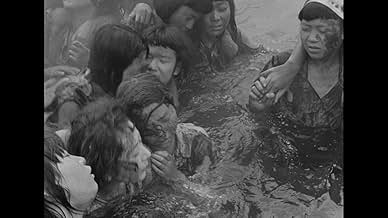Adicionar um enredo no seu idiomaBrilliant and extremely realistic retelling of the day in Hiroshima that the bomb dropped and following days.Brilliant and extremely realistic retelling of the day in Hiroshima that the bomb dropped and following days.Brilliant and extremely realistic retelling of the day in Hiroshima that the bomb dropped and following days.
- Direção
- Roteirista
- Artistas
Avaliações em destaque
But I think so long as people are aware that Japanese films also cover the effects of the atomic bomb while focusing on its victims, then that entirely negates the need for an American or English filmmaker to cover such a perspective. Unfortunately, not many people do seem to know about 1953's Hiroshima, as it only has about 1100 views on Letterboxd and about half of that on IMDb. It should be more well-known, though, because it's an impressively made and remarkably realistic depiction of the 1945 bombing of Hiroshima, including the aftermath and how the city grappled with the devastation following the end of World War II.
The film's commendable for how grounded and intensely real it all feels. The production value is, for the most part, incredible, with the scenes set right after the bombing feeling truly authentic and harrowing. It's a very tough film to sit through, but I think much of it will stick with me, and I don't feel like there are a ton of movies 70+ years old that feel quite this visceral.
I think the final act gets a little unfocused, if I was to have a complaint. I thought it all was losing me a bit towards the end, but then the final scene comes around and ties just about everything together in a haunting and effective way. It's not a film I think I'll ever rewatch, but I'm glad I've seen it now, because there's a ton to appreciate within this very hard-hitting historical drama.
I'm not sure the Teacher's Union got what they wanted out of this movie; the trouble with directors is they go off and make the movie they want instead of the one you want. In any case, some of the sequences looked like modern 'slow zombie' movies, except they seemed much more real and terrifying. The union did not make a third movie. Perhaps they ran out of money.
Você sabia?
- CuriosidadesMore than 100,000 people acted as extras without pay in the making of the film, most of whom were Hiroshima locals, and many of whom had lost friends or family in, or had even personally survived, the bombing.
- Citações
Narrator: For a moment, the navigator forgot he was in a war and gave himself over to his thoughts. He suddenly remembered what was about to happen to the people of Hiroshima. His mission was bringing doom to those people. The "gadget" in the belly of his plane was a weapon far beyond imagination. It was an atomic bomb. The 20th Century had seen the advent of a bomb powerful enough to kill every human being within a kilometer of its blast center. Worse still, the radioactivity from the bomb would do incalculable damage to all living creatures in the vicinity. Hiroshima would instantly become a city of corpses. That thought led Van Krik to a feeling of utter emptiness. Overwhelmed by sadness, desperate for something to cling to, he suddenly recalled his mother's face.
- Versões alternativasThere is an Italian edition of this film on DVD, distributed by DNA Srl: "HIROSHIMA (1953) + LE CAMPANE DI NAGASAKI (1950)" (2 Films on a single DVD), re-edited with the contribution of film historian Riccardo Cusin. This version is also available for streaming on some platforms.
- ConexõesFeatured in Hiroshima, Meu Amor (1959)
Principais escolhas
- How long is Hiroshima?Fornecido pela Alexa
Detalhes
Bilheteria
- Orçamento
- US$ 240.000 (estimativa)
- Tempo de duração1 hora 44 minutos
- Cor
- Mixagem de som
- Proporção
- 1.37 : 1
























